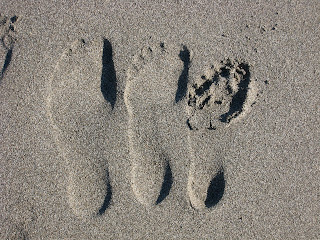Mental and emotional well-being is closely linked to physical health. "Cogito, ergo sum" Descartes wrote. "I think, therefore I am". More aptly for the human being, a social animal, would be "you acknowledge me, therefore I am."
 |
| part of a greater whole |
As creatures whose existence depends on the skills of others, we are poorly equipped to survive in isolation. Sure, people have survived outside of human populations, but, in general, not only are we dependent on the skills of others, emotionally we fare better when we have a distinct, predefined role to play within a supportive community. Fundamentally, every human wants and needs...
- to be acknowledged: the fact that you react to me when we cross paths means that I am alive. I exist. This acknowledgment might be given via simple eye contact, a nod of the head, a hand wave, or, better yet, verbal interaction. "Hello, how are you?" Being ignored can hurt.
- to be appreciated: even better, if you value what I do and provide me with positive feedback, I feel even more gratified to be alive. A little appreciation goes a long way. Take a moment to look at this amusing video: http://www.youtube.com/watch?v=Cbk980jV7Ao If I render a service to you, or give you a material gift, the simple act of saying 'thank you', not only confirms receipt, but makes me feel appreciated (and increases the chances of repetition).
- to be needed: I want to believe that someone else is doing better because I exist. This is an incredibly powerful emotion that keeps sleep-deprived parents sane when their infants' cries wake them up for the nth time during the night.
- to be cared for: someone out there is concerned that I am well. Studies have shown that merely living together is not as beneficial for health as living with those who sincerely care about you.
- to be loved: this is the ultimate reward of being a member of a society. A hermit may feel loved by a god-like creature, but I prefer to receive this confirmation through all five senses (rather than simply cerebrally). Being loved and being able to love makes me feel alive and makes life worthwhile.
Sally Beare quotes several studies that confirm that people who are (happily) married live longer. According to the study by Warwick university, married people - especially men - live up to three years longer. Note that the assumption is that you are in a healthy relationship i.e. one in which respect and the desire to meet the partner's needs happen on a reciprocal basis. If you are married to a person who always puts their own wants and desires above yours, you would be better off without this person. Equal partners realize that they are stronger in a partnership, and will take extra care to ensure the partnership continues and thrives. They will urge their partner to seek medical advice when necessary, and will keep an eye out for the well-being of the loved one. In 'A Cry Unheard: New Insights into the Medical Consequences of Loneliness", psychologist Dr. James J. Lynch writes that 'mortality rates in the United States for all causes of death, and not just for heart disease, are consistently higher for divorced, single, and widowed individuals of both sexes and all races".
Over and over, when unspeakable crimes occur, in which classmates are shot or innocent movie-goers are killed, the perpetrator(s) have been severely lacking in interpersonal and social skills and been isolated long before committing their crime. For whatever reason, they have failed to connect in a healthy manner with a close community of friends. They have lost all moral perspective. Drowning in a quicksand of futility, desperate and filled with hatred, these sociopaths turn against society in the ultimate selfish act of creating bottomless grief for those who are firmly anchored in supportive, loving communities. It is as if these misfits are screaming:"Look at me, I am not loved, I am not appreciated, nobody gives a damn about me, I am not needed. I am not acknowledged... I will MAKE you acknowledge me, whether you like it or not, by destroying what you love and what appreciates and needs YOU!"
So to keep a sense of perspective, to tend to your garden of healthy, emotional needs, marry a wonderful person, or surround yourself with dear, supportive, genki* friends. Or, if you are in a hurry, run to the nearest shelter and adopt a homeless dog. The dog will give you unconditional love and will always greet you joyously when you come home - irrespective of your mood. And that dog, according to the University of Warwick scientists, will triple your chances of making a friend. And a good friend is great for health!
*genki: Okinawan expression for 'happy and healthy'



